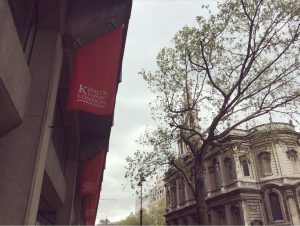

One of my main motivations for studying towards a Comparative Literature MA was (and still is) that it’s an incredibly enriching area of scholarship. It enables a sharp focus on the global contexts of literature and the connections that can be made across geographic and linguistic boundaries. After studying full-time on the Comparative Literature MA for the last semester and a half, I can safely say that I made the right choice for 5 main reasons.
1. Academic Diversity
The course structure is unique in that you take 6 modules equally spread across two terms, and then spend the summer writing a 10,000-word dissertation. This enables you to engage with a wider range of academic materials than other literature courses offered by King’s, where you can only take four modules across two semesters. This is great for someone like me as I have wide-ranging academic interests, varying from world literature to internet cultures to identity politics.
2. Flexibility
Since students of Comparative Literature take more modules, there is a higher degree of flexibility for the courses you can take. Of the 6 modules you’re enrolled on, 2 of these can be outside of the Comparative Literature department if they’re within the Faculty of Arts and Humanities. For example, I’ve been lucky enough to take modules in the English and Digital Humanities departments, thereby allowing me to tailor my degree to be inclusive of my varied academic interests. This flexibility is also a great way to engage with different departments and become more involved in the wider academic community at King’s. This might be especially important to consider if you plan on pursuing a PhD.
3. Global Literature

One of the main reasons I chose the Comparative Literature was because of its heavy focus on global literature. It has been really fascinating to immerse myself in the histories and literature of cultures that have been conspicuously absent from my previous curriculum. While I, unfortunately, don’t speak a second language, it has been wonderful reading texts in translation and comparing texts across cultures to see what insights can emerge. This focus on world literature is also included in the dissertation, which has to meet at least one of the following specifications: cover two or more literary cultures; cover two or more languages; focus on two or more mediums (e.g. literature and photography); include literature and another discipline (e.g. history). This structure offers multiple entry points for your independent research project, which helps to focus broader academic interests into a more productive pathway for analysis.
4. Employability
In an increasingly globalised world, the ability to critically make connections between different cultures is becoming more important. Although life after education can be a mildly terrifying concept, it’s made easier by the numerous transferable skills that a Comparative Literature MA offers students.
5. Small Department
Finally, unlike other departments in the Arts and Humanities Faculty, Comparative Literature is relatively small. Personally, this is something I love because you can really get to know your peers, both staff and students, so it feels much more supportive and close-knit as an academic community. This support-system becomes an invaluable asset during deadline seasons, where you help each other out by recommending readings and proofreading each other’s essays.
Overall, I feel really lucky to have been studying the Comparative Literature MA here at King’s, and I’m excited to see what my final two semesters have to offer!
Read More
Check out Nina’s post about the differences between undergraduate and postgraduate study.
Read about why you should study something you love at university.

Leave a Reply